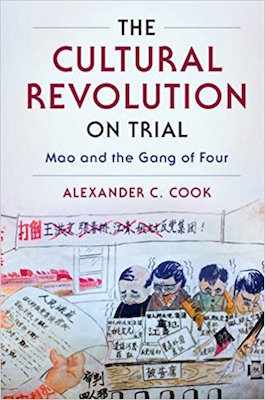By Liz Carter
Forced confessions, show trials, and crises of legitimacy. These are topics covered in Alexander C. Cook’s important book, The Cultural Revolution on Trial: Mao and the Gang of Four, which Cambridge University Press published in November. They are also issues China has been facing recently, as Xi Jinping has sought to consolidate power and bolster faith in the Communist Party. Cook’s primary purpose is not, however, to offer a cautionary tale about history repeating itself, but to put forward a novel framework for understanding historical trauma, its roots, and its repercussions.
Covering the period from the end of the bloody Cultural Revolution in 1976 to the economic and political reforms in the early 1980s, Cook’s work (his first book but second major publication, after Mao’s Little Red Book: A Global History, which he edited and Jeff Wasserstrom praised in a 2014 China Blog post) provides a close account of the leadership’s effort to move past its troubled legacy without losing legitimacy. More importantly, it makes room for the voices of non-state actors on the contested issues of humanism, justice, and healing. Chapters on the trial of prominent party leaders, known as the Gang of Four and Lin Biao clique, are interposed with chapters on three different influential literary works from the time period, balancing state sources and state priorities with more grassroots publications and perspectives. In essence, the book is less about the trial depicted on the cover — in which Mao’s widow Jiang Qing and other vilified leaders are charged and convicted of crimes by the state — than the broader struggle in China to understand how the unthinkable could have happened, how to settle accounts from a turbulent time, and how to move forward in a new direction.
By devoting almost as much time to these literary works as to official records and reporting on the trial itself, Cook argues, convincingly to me, for their importance as historical sources. The three literary works he examines are Between Man and Monster (1979), a work of long-form narrative journalism by Liu Binyan, Humanity, Ah Humanity (1980), a groundbreaking novel by Dai Houying, and Six Records of a Cadre School (1981), Yang Jiang’s series of short autobiographical accounts. These works embody ideas about justice, healing, and reality offered by those who lived through the Cultural Revolution – Liu and Yang as prisoners in labor camps, and Dai as a some-time Red Guard. In this sense, The Cultural Revolution on Trial joins other recent books, such as Jeremy Brown and Matthew D. Johnson’s edited volume on Maoism at the Grassroots, which complicate and challenge the sort of top-down narrative control that the Chinese leadership has tried (and tries) to exert. One thing that makes The Cultural Revolution on Trial distinctive is that it takes this kind of bottom-up approach to the history of the PRC forward beyond the death of Mao, whereas most of the previous works in this vein by historians, such as the Brown and Johnson collection and before that Gail Hershatter’s The Gender of Memory, have focused on the years when the country’s first paramount leader was heading the Party.
The book has its gaps. A pages-long discussion of the word “Ah” in the title of Dai Houying’s novel cites only the novel itself and one dictionary, ignoring a wealth of linguistic scholarship on this Chinese character’s pragmatic and semantic functions. There is also very little in the way of interviews, although many people are alive today who endured and remember the time period in question. However, these are less failings of Cook’s — who is a historian after all, not a linguist or a journalist — than suggestions — from a linguist who has worked in journalism — of fruitful areas that others may want to explore in future investigations. Like other good books, The Cultural Revolution on Trial sparks curiosity and contemplation, leaving the reader with questions as well as answers.
At 277 pages (234, without the references), The Cultural Revolution on Trial is a succinct account of one of the most pivotal points in modern Chinese history: the end of the chaos and bloodshed of the decade-long Cultural Revolution, and the beginning of an era of economic reform. However, this slim volume is more than long enough to propose a different way of viewing that history, one that also raises questions about how we perceive and cover ongoing issues in China today.


